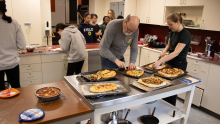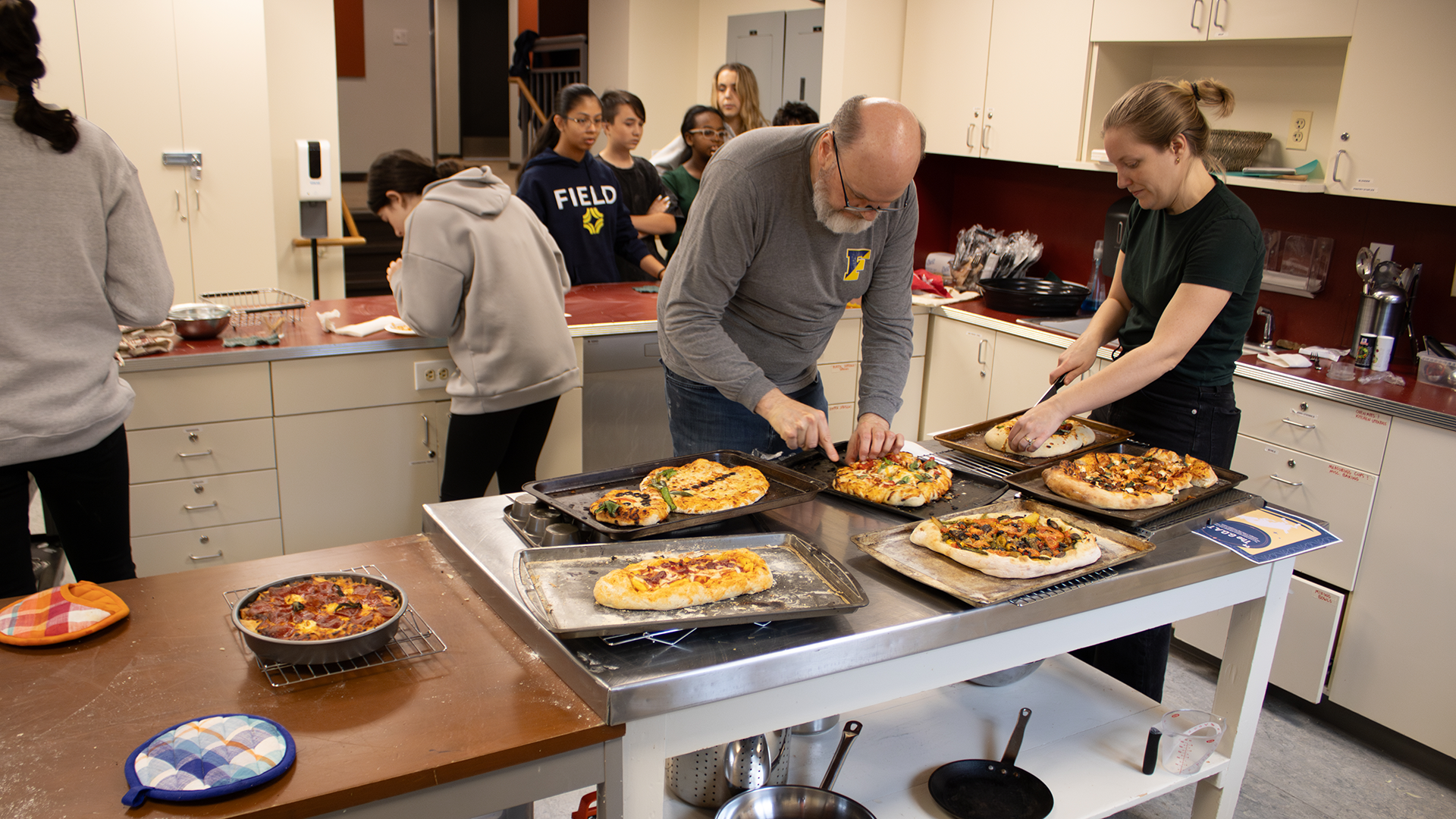
English Teacher John Cichello shares our journey of implementing Middle School Inquiry Projects and how we encourage students to ask essential questions.
“What do you want to know?”
“What do you want to be able to do?”
“Who do you want to be?”
These are some of the essential questions behind education that form the foundation of our Middle School Inquiry Projects, which we initiated this school year (2023-24). The questions are lived out during each Y Block on our schedule and throughout the Intersession period in January.
As a teacher at Field, I often instill choice in my classroom projects and encourage groups to form around common interests. How does this differ from a traditional classroom? I typically enter a unit of learning having pre-determined the essential skills I want students to gain, identifying guiding questions, and creating parameters for the assignments and projects by which students will exhibit their growth in knowledge and skills. In the inquiry-based approach, students develop the essential question of their inquiry - albeit with a lot of guidance. The students construct the pathway to get there depending on their learning and skills of interest.
In addition to learning the ideas and skills of their areas of interest, students also learn the ideas and skills of building questions, developing plans, and executing those plans. These skills include asking questions, researching answers, interpreting information, presenting findings, and reflecting on their process and outcomes.
Over the fall semester, we encouraged middle school students to engage in these questions. Initially, it was a challenge, as what they were most interested in for the 45-minute Y Blocks was, “But what are we going to DO?” And, to be honest, I often walked out of those sessions with the same question echoing in my brain. Mentoring students through this process helped them understand that it is not just about the end product but that how they got there was just as important.
After 6th and 7th grade Advisory groups discussed possible inquiry projects in the fall, 13 students expressed interest in “ALL THINGS FOOD.” As we began our pursuit of food, the students rushed to the question, “But what are we going to DO?” My role as their guide was to push back to the basics:
“What do you want to know?”
“What do you want to be able to do?”
“Who do you want to be?”
Through November and early December, we explored possible topics, and the students laid out a rough plan for the eight Intersession days in early January. As their teacher and inquiry guide, I set some ground rules and helped them think through possibilities—and understand the limitations.
We brainstormed what “ALL THINGS FOOD” meant:
Of course, eating was their number one focus, but as we explored, we learned there was so much more to know about food. We quickly realized that we had better get a bit more focus on our group work. Ultimately, we researched food as an expression of culture and the process of making (and consuming) delicious meals and treats.
Throughout this process, I regularly consulted with faculty member Susanna Stossel, who is coordinating the Middle School Inquiry Program, about the question, “But what are we going to do?” The challenge for me, as an educator, was to set some guardrails and allow the students to define their course for the inquiry. My job is not to give them the answers, rather to lead the students in these ways:
Encouraging questions to flow rather than providing quick answers ensures that voices are heard and respected. As we developed the overall learning plan, we continued to move toward shared goals. Through this process, I find myself learning alongside my students.
We left semester 1 with a plan that had a strong focus on exploring the flavors of and cultures behind food and began semester 2, putting that plan into action with additional support from fellow faculty member Carolyn Lucey. On day 1 of Intersession in early January, we took a trip to the library, where several students got their first library card, and all students selected a book about food to guide our continuing exploration. We took a field trip to Union Market, where some students explored the cultural expressions of food while others explored the best value and flavor in the french fries. We also viewed the food exhibit at the Smithsonian Museum of American History, learning about the marketing of food and the development of the recent "foodie" culture.
The group came into the project with a strong interest in cooking, so we built that into the plan. Each day, a pair of students brought in a snack for the group: some used the cookbook that they had picked up at the library to find a recipe; others made and brought their family’s “go-to” snack, others brought in a snack that expressed their family’s culture. A highlight in January was a pizza-making contest. Groups of two students were provided with dough, sauce, and basic toppings that the entire group suggested for ingredients. Working in teams of two, students designed their pizzas, learned how to cook them, and discovered the best mixes of flavor and appearance. As a full group, the students established the criteria for ratings: most delicious, best appearance, best cheese pull, sauce-crust-topping balance, and most creative. Creativity did abound: groups made a snowman pizza, one with pepperoni rosettes, a vegan pizza, a stuffed pizza, and all sorts of interesting combinations of flavors.
As I write this, the inquiry process continues. Students are moving from working as a group to developing independent inquiry projects around "All Things Food." Again, my role is to provide guidance and support - and encourage the questions.
This middle school experience has inspired me as I design a Senior English Seminar: “Literature of Immigration and Assimilation.” For this course, I have a focused plan for the first semester, which includes each student designing their inquiry project for the second semester, which includes exploring these questions:
“What do I want to know?”
“What do I want to be able to do?”
“Who do I want to be?”
They further their exploration by asking, “How am I going to develop a project through which I can show this new knowledge and skill to the world?” and “Who am I becoming through this process?”
The old ad campaign for The National Enquirer rings in my head, “Inquiring Minds Want to Know.” As students grapple with questions, they become invested in finding the answers. The next question is often, "Isn’t this the hope of education?"
